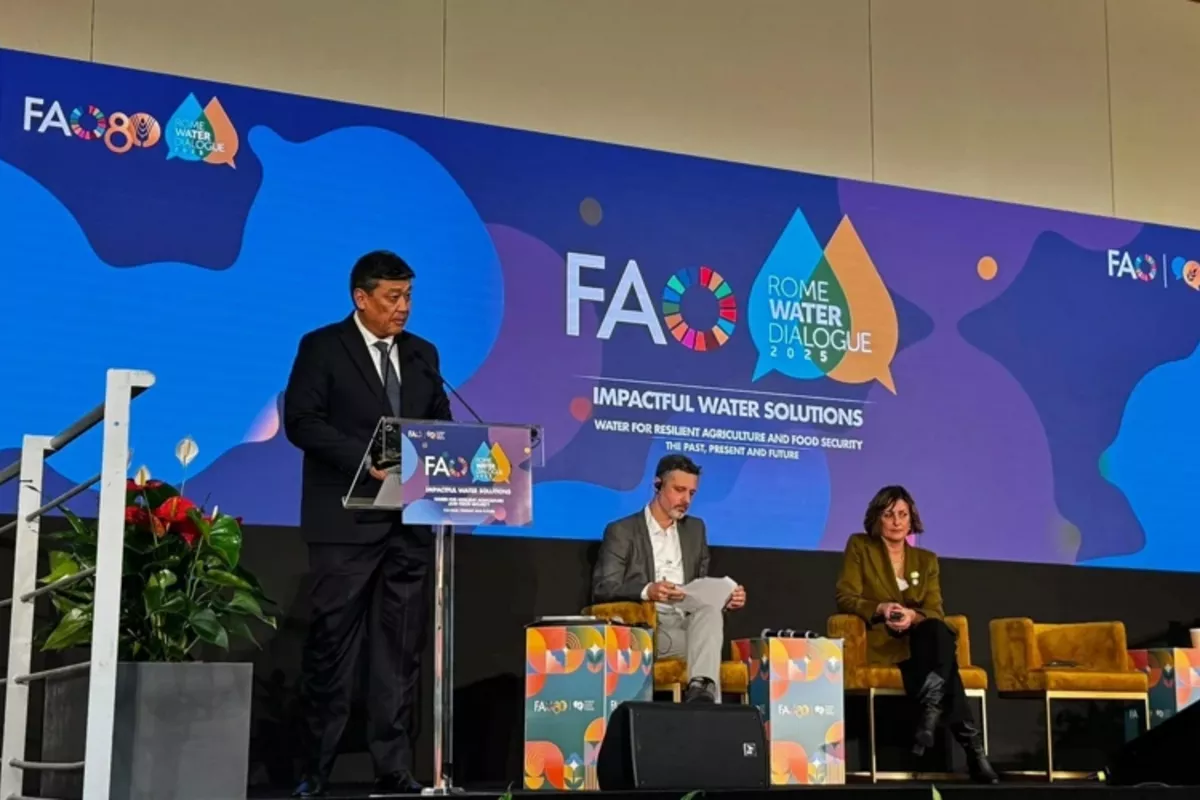
photo: Kazinform
Bakyt Torobaev, Deputy Chairman of the Cabinet of Ministers and Minister of Water Resources, Agriculture and Processing Industry of Kyrgyzstan, has delivered a compelling appeal for urgent global cooperation on water scarcity, climate change, and sustainable water management in Central Asia.
Torobaev made these remarks at the “Impactful Water Solutions” session of the Rome Water Dialogue 2025, The Caspian Post informs via Kazakh media.
Held at the headquarters of the UN Food and Agriculture Organization (FAO) in Rome, the international forum brought together policymakers, scientists, and global leaders to tackle one of the most pressing global challenges - ensuring water security in a rapidly changing world.
Water as a Strategic Asset
In his keynote, Torobaev emphasized that water is not just a natural resource, but a strategic pillar of national stability and prosperity, essential for economic growth, food and energy security, public health, and ecosystem resilience.
“Water is the foundation of life, health, and sustainable development,” he said. “In Central Asia, managing water resources wisely is now an urgent necessity as we grapple with climate change.”
Climate Change Threatens Regional Water Supply
The minister raised alarm over the growing impact of climate change and population growth, which he said are driving global water scarcity to critical levels. By 2050, he warned, half the world’s population may face water shortages, presenting a serious challenge to food systems and global stability.
Torobaev highlighted the importance of Kyrgyzstan’s glaciers, which feed the region’s major rivers and supply water to Kazakhstan, China, Tajikistan, and Uzbekistan. He urged both regional and international partners to join forces in safeguarding these essential natural reservoirs.
Kyrgyzstan’s Green Heritage Initiative
Torobaev commended President Sadyr Japarov’s “Green Heritage” program, a national strategy aimed at protecting Kyrgyzstan’s mountains, rivers, and glaciers - key sources of water for the broader region.
He also expressed concern about the falling water levels in Lake Issyk-Kul, warning that the lake’s ecological significance and role in maintaining climate balance must not be underestimated.
“The tragedy of the Aral Sea is a stark reminder of what can be lost. We cannot afford to repeat that mistake,” he said. “Water security is not just an environmental issue - it is a critical pillar of sustainable development, both nationally and globally.”
Aging Infrastructure and the Cost of Inaction
Torobaev drew attention to the dire state of water infrastructure in Central Asia, with 80% of systems outdated and water loss rates reaching 55%. In Kyrgyzstan, 10 million people still lack access to safe drinking water, and $1.2 billion is needed to provide water to 960 rural villages.
“If we delay action, restoring lost water capacity will cost three times more. We must begin to value water the way we value oil and gas,” he emphasized.
Thanks to FAO and International Partners
In closing, the minister thanked the FAO for its ongoing collaboration on projects that have introduced innovative technologies, improved food security, and strengthened rural development in Kyrgyzstan.
“We are grateful for FAO’s steadfast support, openness to dialogue, and shared vision for sustainable growth in our agro-industrial sector,” Torobaev said.
A Call for Regional Solidarity
Torobaev’s remarks were in line with broader regional efforts to address shared environmental challenges. Kazakhstan, for example, has proposed joint initiatives to protect the Caspian and Aral Seas, as well as regional glaciers - reinforcing the need for coordinated action in securing Central Asia’s water future.
Share on social media